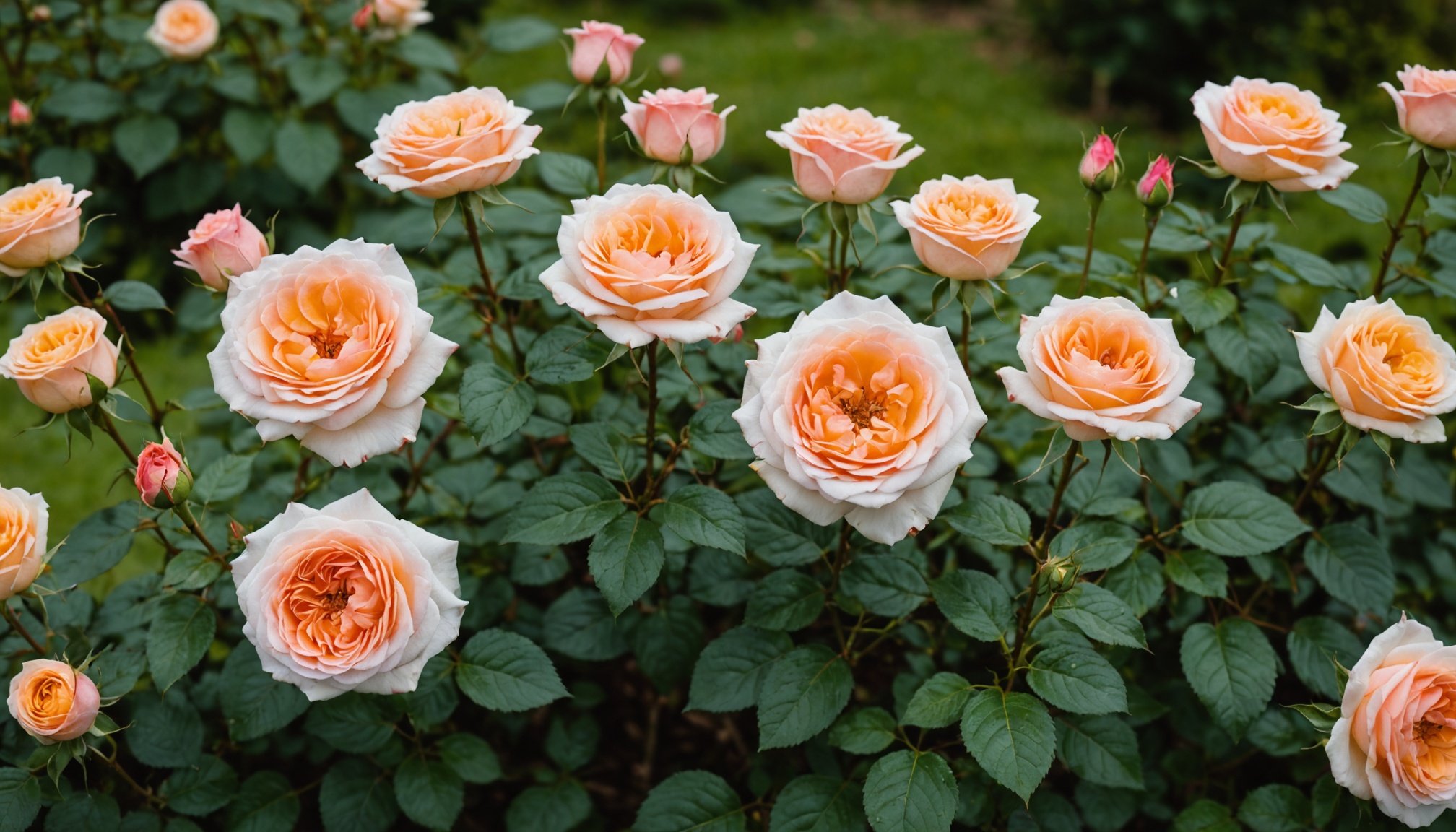Unlocking the Secret: The Perfect Soil pH for Thriving Roses in the UK
When it comes to growing roses in the UK, one of the most critical factors to consider is the soil pH. Roses, whether they are hybrid tea, English roses, or any other variety, have specific soil requirements to thrive. In this article, we will delve into the world of soil pH, exploring what it means, how to test it, and most importantly, how to create the perfect soil environment for your roses.
Understanding Soil pH
Soil pH is a measure of the acidity or alkalinity of your garden soil. It is a crucial aspect of plant growth because it affects the availability of nutrients for your plants. The pH scale ranges from 0 to 14, with 7 being neutral, below 7 being acidic, and above 7 being alkaline.
Dans le meme genre : Clean your fridge: vital home improvement tips for efficiency
Why is Soil pH Important for Roses?
Roses generally prefer a slightly acidic to neutral soil pH, ranging from 6.0 to 6.5. This pH range allows for the optimal uptake of essential nutrients such as phosphorus, potassium, and other micronutrients that are vital for plant growth.
| Soil pH Range | Effect on Roses |
|
|------------------|
| Below 6.0 | Too acidic, may lead to nutrient deficiencies and poor growth |
| 6.0-6.5 | Ideal for roses, promotes healthy growth and nutrient uptake |
| 6.5-7.0 | Neutral, still suitable but may require additional nutrient adjustments |
| Above 7.0 | Too alkaline, can cause nutrient lockout and poor plant health |
Testing Your Soil pH
Before you can adjust your soil pH, you need to know what it is currently. Here are a few methods to test your soil pH:
A lire également : Unlocking the Secrets to Thriving Winter Gardening in the UK”s Chilly Climate
DIY Soil Testing Kits
These kits are available at most gardening stores and provide a quick and easy way to get an approximate pH reading. They usually involve mixing a small sample of your soil with a testing solution and comparing the resulting color to a chart.
Professional Soil Testing
For a more accurate reading, you can send a soil sample to a laboratory for analysis. This method provides detailed information not only on pH but also on nutrient levels and other soil characteristics.
Using pH Meters
pH meters are electronic devices that give you an instant reading of your soil pH. They are more accurate than DIY kits but require calibration before use.
Adjusting Your Soil pH
Once you have determined your soil pH, you may need to make adjustments to create an optimal environment for your roses.
Lowering Soil pH (Making it More Acidic)
If your soil is too alkaline, you can add organic matter such as peat moss, ericaceous compost, or elemental sulfur to lower the pH.
- Peat Moss: This is a natural, acidic material that can help lower the pH of your soil. Mix it into the soil at a rate of about 2-4 inches deep.
- Ericaceous Compost: This type of compost is specifically designed for acid-loving plants and can help adjust the pH while adding nutrients.
- Elemental Sulfur: This is a more aggressive method and should be used sparingly. It can take several months to lower the pH, so plan accordingly.
Raising Soil pH (Making it More Alkaline)
If your soil is too acidic, you can add lime to raise the pH. Here are some options:
- Dolomitic Lime: This type of lime not only raises the pH but also adds magnesium and calcium to the soil.
- Calcitic Lime: This is a quicker-acting lime that raises the pH without adding magnesium.
Creating the Perfect Soil Structure
In addition to the right pH, roses need a well-structured soil that drains well and retains moisture.
Adding Organic Matter
Organic matter such as compost, well-rotted manure, or leaf mold can significantly improve soil structure. Here’s how you can incorporate these into your garden:
- Compost: Add a 2-3 inch layer of compost to the soil and mix it in before planting. Compost helps in retaining moisture, improving drainage, and providing essential nutrients.
- Well-Rotted Manure: Similar to compost, well-rotted manure adds nutrients and improves soil structure.
- Leaf Mold: This is a rich, humus-like material made from decomposed leaves. It is excellent for improving soil structure and retaining moisture.
Practical Tips for Growing Healthy Roses
Here are some practical tips to ensure your roses thrive in the UK climate:
Plant Care in Early Spring
In early spring, before new growth begins, prune your roses to promote healthy growth and remove any dead or diseased wood. Also, apply a layer of compost or well-rotted manure around the base of the plants to provide nutrients as they start to grow.
Watering and Mulching
Roses need consistent moisture, especially during their first year of growth. Water them deeply once or twice a week, depending on weather conditions. Mulching around the base helps retain moisture, suppress weeds, and regulate soil temperature.
Pest and Disease Management
Regularly inspect your roses for signs of pests or diseases. Use organic methods whenever possible to control issues such as aphids, black spot, and powdery mildew. For example, neem oil can be used to control pests, and copper-based fungicides can help manage diseases.
Examples of Successful Rose Gardens
Let’s look at a few examples of how gardeners have successfully created the perfect soil environment for their roses.
Using Ericaceous Compost
“I have a garden full of English roses, and I found that using ericaceous compost really made a difference. The slightly acidic nature of this compost helped my roses grow healthier and produce more blooms,” says Jane, a gardener from Surrey.
Adding Compost and Manure
“I mix a combination of compost and well-rotted manure into my soil before planting my hybrid tea roses. This not only improves the soil structure but also provides a slow release of nutrients throughout the growing season,” explains Mark, a rose enthusiast from Kent.
Growing thriving roses in the UK is not just about planting them in any soil; it requires careful attention to the soil pH and structure. By understanding the importance of slightly acidic soil, testing and adjusting your soil pH, and adding organic matter to improve soil structure, you can create an ideal environment for your roses to flourish.
Here is a detailed list of steps to follow for optimal rose growth:
- Test your soil pH using DIY kits, pH meters, or professional testing.
- Adjust the pH if necessary, using materials like peat moss, ericaceous compost, or lime.
- Add organic matter such as compost, well-rotted manure, or leaf mold to improve soil structure.
- Water and mulch regularly to maintain consistent moisture levels.
- Inspect for pests and diseases and use organic control methods whenever possible.
By following these steps and maintaining a low-maintenance yet nutrient-rich garden, you can save your roses from common issues and ensure they remain healthy and vibrant throughout the growing season.
As any seasoned gardener will tell you, the key to thriving roses is in the soil. So, take the time to get it right, and you’ll be rewarded with a garden full of beautiful, blooming roses.











